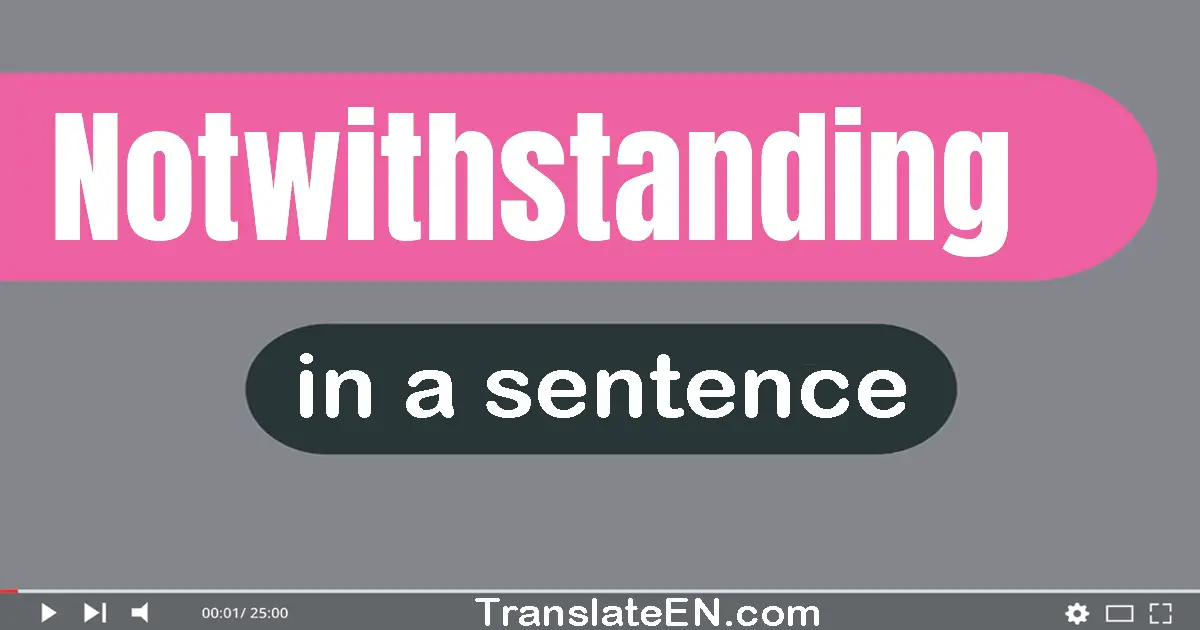Notwithstanding in a sentence
Synonym: despite, in spite of. Antonym: because of, owing to
Meaning: In spite of; despite.

(1) Notwithstanding the challenges, they never gave up.
(2) Notwithstanding the obstacles, they achieved their goals.
(3) Notwithstanding the disagreement, they found a compromise.
(4) The team played well, notwithstanding their lack of experience.
(5) The concert was amazing, notwithstanding the long wait in line.
(6) Notwithstanding the difficulties, they successfully completed the task.
(7) Notwithstanding his busy schedule, he always finds time for his family.
(8) Notwithstanding the late hour, he decided to go for a walk in the park.
(9) Notwithstanding the heavy rain, the football match continued as scheduled.
(10) Notwithstanding the fact that he was injured, he managed to finish the race.
Notwithstanding sentence
(11) Notwithstanding the opposition from some members, the proposal was eventually approved.
(12) Notwithstanding the high cost of living, many people still choose to live in big cities.
(13) Notwithstanding the long queue, she patiently waited for her turn at the ticket counter.
(14) Notwithstanding the criticism, the artist continued to pursue his unique style of painting.
(15) Notwithstanding the language barrier, they managed to communicate effectively through gestures.
(16) Notwithstanding the pandemic, the company managed to stay afloat by adapting to the new normal.
Notwithstanding meaning
Notwithstanding is a versatile word that can be used in various contexts to convey contrast or opposition. It is often used to introduce a clause or phrase that contradicts or qualifies the information presented in the previous part of the sentence. Here are some tips on how to effectively use the word notwithstanding in your writing:
1. Understand the meaning: Before using notwithstanding, it is crucial to have a clear understanding of its meaning. Notwithstanding is a preposition that means "in spite of" or "despite." It is used to indicate that something is true or exists despite other factors or circumstances.
2. Identify the appropriate context: Notwithstanding is commonly used in formal or academic writing, legal documents, and discussions where contrasting or opposing ideas need to be expressed. It is often employed to introduce exceptions, limitations, or contradictory evidence.
3. Use it to introduce a contrasting idea: One of the primary functions of notwithstanding is to introduce a clause or phrase that contrasts with the information presented earlier in the sentence.
For example, "She decided to go on the trip, notwithstanding her fear of flying." In this sentence, notwithstanding introduces the idea that the person overcame their fear and still chose to go on the trip.
4. Place it at the beginning or middle of a sentence: Notwithstanding can be used at the beginning or in the middle of a sentence, depending on the desired emphasis. When used at the beginning, it draws immediate attention to the contrasting idea.
For example, "Notwithstanding the rain, the event was a huge success." When used in the middle, it provides a smoother transition between ideas. For instance, "The team worked diligently, notwithstanding the challenges they faced."
5. Pair it with a comma: When using notwithstanding, it is common to follow it with a comma to separate the contrasting clause or phrase from the rest of the sentence. This helps to clearly indicate the contrasting idea and improve readability.
For example, "He was determined to finish the race, notwithstanding his injury."
6. Avoid overusing notwithstanding: While notwithstanding is a useful word, it is important not to overuse it in your writing. Using it sparingly will make your writing more impactful and prevent it from becoming repetitive or monotonous. Instead, consider using alternative phrases such as "despite," "in spite of," or "regardless of" to vary your sentence structure.
7. Consider the formality of your writing: Notwithstanding is more commonly used in formal or academic writing. If you are writing in a more casual or conversational style, it may be more appropriate to use simpler alternatives like "despite" or "even though."
In conclusion, notwithstanding is a valuable word that can enhance your writing by introducing contrasting ideas or exceptions. By understanding its meaning and following these tips, you can effectively incorporate notwithstanding into your sentences and convey your intended message with clarity and precision.
The word usage examples above have been gathered from various sources to reflect current and historical usage of the word Notwithstanding. They do not represent the opinions of TranslateEN.com.
